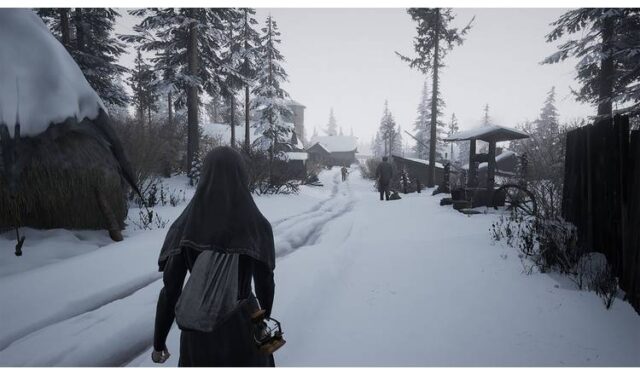
Indika is an intriguing experience. In parts, it mimics what you might expect from the life of a nun: a calm, reflective pace, the opportunity to think about situations with rational thought mixed with lunacy, and regular dips into the devil’s back garden. Ok, maybe not exactly how you’d imagine the life of a nun, but even so… taking the role of a young nun named Indika, you’ll leave the safety of your convent and enjoy on a journey across 19th-century Russia. It’s equal parts soothing and disturbing, calm and bonkers, beautiful and insane. And I’m left not entirely convinced that I haven’t just been absolutely played for a fool for the last few hours. It’s really quite something.
One of the common aspects of Indika is its puzzle-solving elements. The game presents a variety of puzzles that range from a bit tricky all the way down to intentionally boring and long winded. These puzzles are thoughtfully integrated into the narrative, requiring you to pay attention to what’s around you and look for things that might make life easier. The satisfaction of solving these puzzles is heightened by the game’s serene pace, allowing you to immerse fully in each challenge without feeling rushed. This calm approach to puzzle-solving makes Indika a perfect game for those who enjoy taking their time to explore and think through each problem, safe in the knowledge that you can’t break it, you can’t run into a game-breaking dead end, and won’t get jump scared by a Russian zombie every 4 minutes.
The atmosphere throughout your time with Indika is great as well. The game beautifully captures the essence of 19th-century Russia, with its detailed environments and hauntingly beautiful landscapes. The developers have done an excellent job of creating a world that feels both vast and intimate, drawing players into its quiet, contemplative spaces. The sound design further enhances this atmosphere, with a subtle and evocative score that complements the game’s visual aesthetic. The combination of these elements creates some wonderful moments, where you’ll be chilling by a stream with calming and soft music, or treated to a bizarre evil circus feeling while praying your way out of of a difficult situation.

But that calm pace I mentioned is one of Indika’s most defining features. Unlike many modern games that emphasise fast-paced action and constant stimulation, Indika encourages players to slow down and savour the journey. This deliberate pacing allows for a more reflective experience, where you can fully appreciate the story and the world around you. The game’s narrative unfolds gradually, giving players time to connect with the characters and the themes being explored. There are several other characters you’ll meet along the way, and it’s nice to know that on the whole you’ll have time to get to know them, see how their often twisted mind interacts with that of Indikia… it really is really nicely written.
I wasn’t sure what to think of Indika before I started, but it doesn’t take long for the mixture of crazy and serene to kick in and wash over you. The majority of the game is a lovely relaxing experience, like watching a slow paced film that slowly unwinds over the course of the few hours it’s in front of you. There’s things to be solved, there’s things to work out, and there’s rocket bike races to win (yup), but if you can forgive some of the puzzles being a bit boring (and even if this is intentional, it doesn’t escape the fact one or two puzzles are boring…) you can get a lot of enjoyment out of this. And if that’s not reason enough, it’s a bargain at under £20. What’s not to like?
Reviewed on PS5

